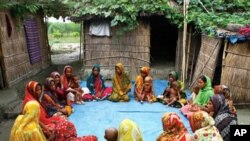One of the world's largest private international humanitarian organizations wants to ensure women have a major say in any climate change agreement.
CARE, with anti-poverty programs in 65countries worldwide, has negotiators in Copenhagen pushing to give women equality all levels of policy-making leading to a final treaty.
"We know that empowering women means effective change,” says Christina Chan, a CARE senior policy analyst. She says gender balance is needed from the local levels, all the way up to global policy making.
Seeking More Than Lip Service
"Some countries want that text eliminated," says Chan, referring to treaty language that would ensure a central role for women a role in decision-making processes. "Leaving it out," she adds, "could mean that adaptation money is not spent on things that make a difference in the lives of people most affected by climate change."
And it's not just about including nice words to appease women. Chan says specific language is critical. "It matters how money is allocated, how it’s targeted, when it’s targeted, and that it’s targeted effectively."
CARE Says Role For Women Critical
Chan says the evidence showing the need for action is clear. A recent United Nations Population Fund report shows women in poor, less developed countries are bearing the brunt of climate change. The report suggests women are the most at risk because of traditional roles of tending to the family, cooking, collecting water and farming.
Chan says that CARE has been imploring delegates to not to forget the poorest and most vulnerable people around the world. She says the current negotiating text that parties are working on does include gender equality in the language.
Governments Divided On Addressing Gender Issue
Chan adds that the governments of Lesotho and Denmark have highlighted the need for more female posts under the convention as well as the treaty addressing the needs and rights of women.
CARES says other countries supporting the language include Finland, Equador, Guatemala, Costa Rica, Bolivia, Iceland, Norway, as well as the European Union and a large block of African nations.
The United States has been noticeably absent on the subject of including gender equality in the negotiating text of the climate treaty. But Kate Gordon, an energy policy expert at the Center for American Progress, says the Obama administration committed to the issue.
“I don’t think the U.S. has taken a formal position," says Gorden. "But we know that Secretary (Hillary) Clinton both historically and in her current position is very focused on the central role of women in global issues and in foreign policy.”
Critics may question the need for gender-based language in the treaty. But Gordon agrees women will bear the impact of climate change policies and need to have a say in what that impact will be. "I think that it would a travesty not to have them at some central place in the decision-making process,” says Gordon.




